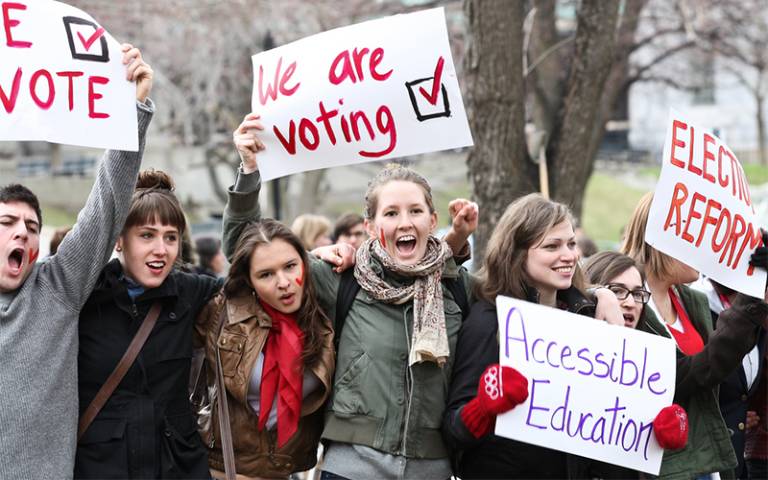Education magnifies social and gender gaps in political engagement
13 December 2022
Young people need better access to civic activities in schools to address social and gender gaps in political engagement that emerge during adolescence, according to a new report by UCL, University of Roehampton and University of Southampton researchers.

Published today and funded by the Nuffield Foundation, the report identifies a growing gender gap in political interest between ages 16 and 30 – with girls less likely than boys to be interested in politics by age 16, and their political interest growing at a slower rate between ages 16 and 30.
At age 16, the probability of girls reporting that they are quite or very interested in politics was around one in four (23%), compared to 28% for boys. By age 30, this gap had widened to just under one in three (29%) for women and more than half (52%) for men.
When breaking these differential growth rates down by highest qualification at age 25, the authors found that women with lower level and upper secondary vocational qualifications (eg Btech) had significantly lower growth rates than all other groups in the study. In fact, the proportion of women with an upper secondary vocational qualification at age 25 who said they are quite or very interested in politics declined from 36% to 19% between ages 16 and 30 - while those with an upper secondary academic qualification (eg A levels) witnessed a growth from 24% to 39% during this time.
The same contrasting trends could not be found for men, as they showed rising levels of political interest between 16 and 30 regardless of their level or type of qualification.
However, the authors found that differing post-16 education pathways could only explain a small part of this growing gender gap, while other factors could not explain this growing gap at all.
Co-author Dr Nicola Pensiero (University of Southampton) said: “Our finding that post-16 educational pathways are related to diverging gender trajectories in political engagement leads us to advocate for more and better civic learning opportunities for those undertaking vocational qualifications in further education colleges. It’s important that we pay particular attention in this respect to courses that are highly gender segregated and attract mainly girls such as care, hospitality and beauty.”
Co-author Professor Jan Germen Janmaat (IOE, UCL’s Faculty of Education & Society) added: “England could learn a lot from countries like France, where the curriculum of vocational education in upper secondary is comprehensive, and where citizenship education is a compulsory component.”
To establish their findings, the team used data from the British Household Panel Study, Understanding Society, and the Citizenship Education Longitudinal Study (CELS) to explore the development of social and gender inequality in political engagement during adolescence and early adulthood.
The researchers used the education of parents as an indicator of social background, and measured political engagement with questions on voting intentions, support for a political party and political interest, ranked on several scales.
The authors then used a variety of methods to investigate how social disparities in political engagement evolve during adolescence and early adulthood - and which educational factors explain this.
They found that the impact of parental education on children’s levels of political engagement changes between ages 11 and 15. Whilst there is no effect at age 11, by the time children reach age 15, the education levels of parents are significant for children’s political engagement.
Despite having the same level of political interest at age 11, children from less well-educated families see their political interest decline between ages 11 and 15, falling from an average of 1.37 to 1.26 using a three-point scale, where one denotes “not interested” and three denotes “very interested”. However, the political interest of those from educated families stayed the same. All groups showed a rising willingness to vote in national elections, but this rose much faster among children from well-educated families: While 54% of the latter said they would vote in adulthood only 44% of those from less well-educated families said they would do so by the time they reached 15. This also indicates a widening social gap.
The researchers found that schools can exacerbate this gap, noting that school factors - such as social composition, political activities, and open climate of classroom discussions - explain almost all of this gap.
They found that children with well-educated parents have higher levels of participation in civic learning opportunities, such as school political activities and classroom discussions of political and social issues. Participation in these opportunities, in turn, is related to a steeper rise in political interest.
The authors also note other important implications for educational policy and practice.
Professor Janmaat added: “Our findings suggest that early adolescence is the crucial period when a social gap in political engagement emerges. Educational conditions relating to lower secondary - ages 11 to 15 - are the key factor that can explain this growing gap.”
Co-author Professor Bryony Hoskins (University of Roehampton) said: “It’s vital that schools can effectively implement initiatives that provide equal access to civic learning opportunities for children from disadvantaged backgrounds to counter existing processes that unintentionally exclude them. Teachers should therefore play a more active role in guiding and facilitating more equitable participation.”
Josh Hillman (Nuffield Foundation) said: “This report highlights how socio-economic factors can influence young people’s engagement and interest in politics. It also demonstrates the importance of accessible and continuing learning, access and exposure to politics and civic participation in schools and colleges to help counter the decline. Equipping and empowering all young people to engage with the political system is vital to help prevent the erosion of trust in public institutions and encourage political engagement.
Links
- Read the full paper
- Professor Jan Germen Janmaat's academic profile
- Centre for Learning and Life Chances in Knowledge Economies and Societies (LLAKES)
- Department of Education, Practice and Society
Image
Credit: Adam Scotti via Flickr.
 Close
Close

